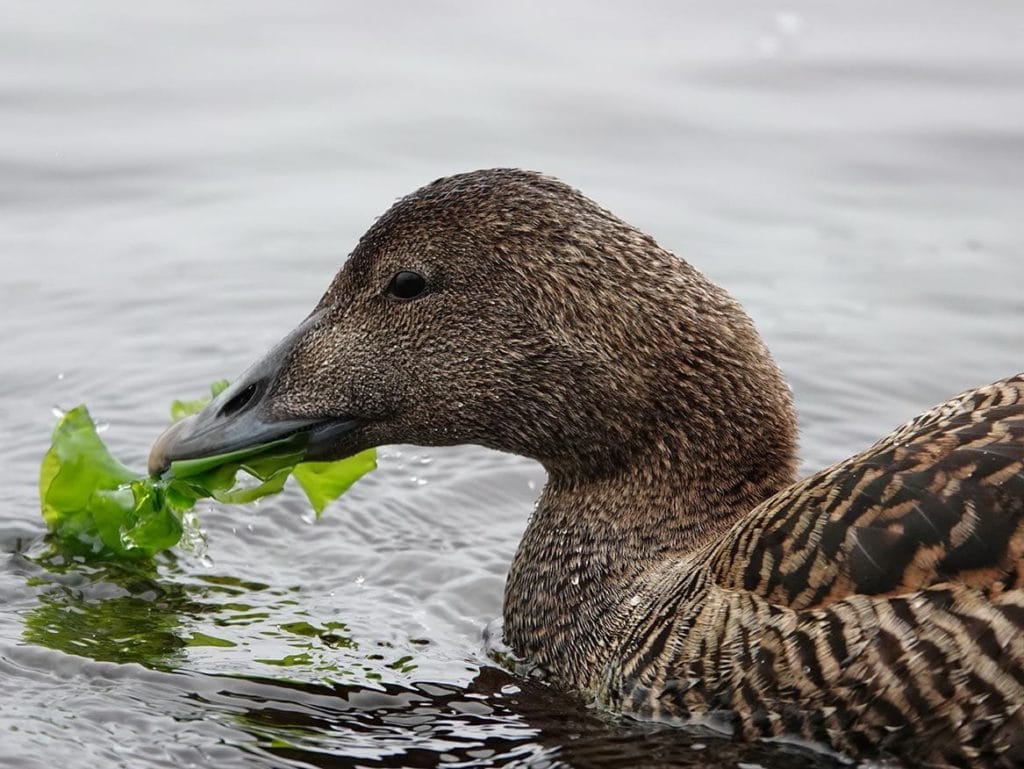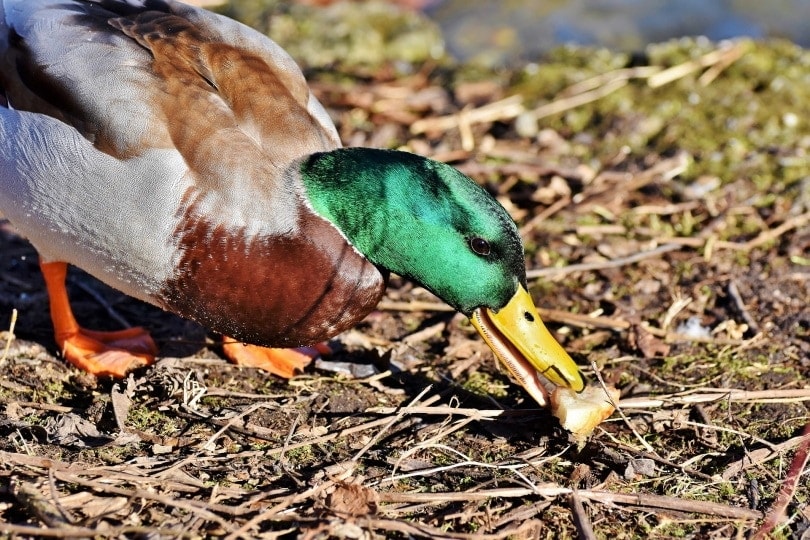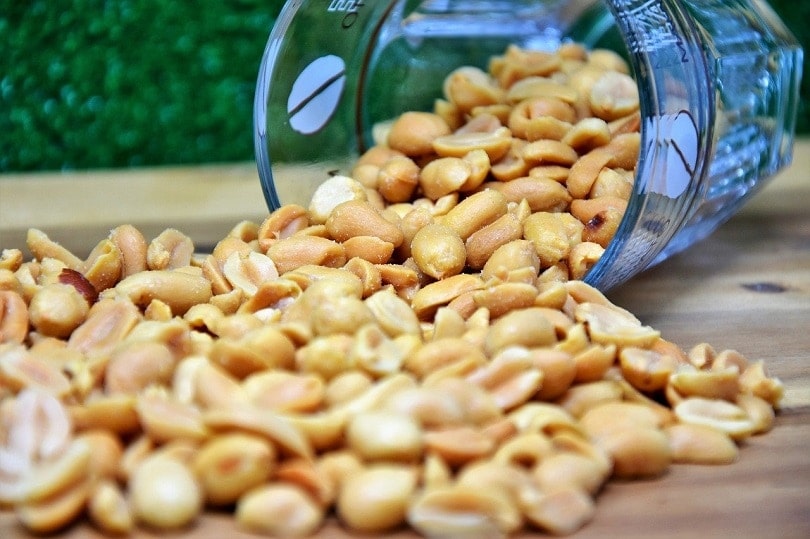What Do Ducks Eat? List of Safe & Dangerous Foods
Last Updated on

TV shows, comics, and movies often depict an age-old tradition of feeding ducks at the park with bread products. Don’t be fooled.
Although this might look like the most convenient and cheapest way to feed your feathered friends, it is actually an unhealthy practice because bread lacks proper nutritional value for ducks and could lead to malnourishment and other health problems.
So, what do ducks eat naturally, and what should you feed them if you find domesticated ones? Read on to find out more.

What Do Mallard Ducks Eat?
Wild mallard ducks are omnivorous birds. Unlike your home ducks, mallards will eat what they come across, with a preference for what is easiest to find. Also, what they eat in the wild will largely depend on the breeding cycle, gender, and age.
Primarily, mallard ducks will feed on aquatic vegetation like water lilies, algae, and grasses. Other foods commonly eaten by wild mallards include insects, fish, snails, worms, and even small amphibians.
In nature, mallards will eat a wide variety of foods depending on the season of the year. In the summer months, these ducks will actively forage for aquatic vegetation and insects. As winter approaches, they start to eat a wider variety of foods, such as berries, seeds, and grains.
Female mallards will eat 28% plants and 72% animals in their diet, while males eat 63% plants and 37% animals. Even though it’s rare, mallards may sometimes feed on tiny water frogs.
Unlike pet ducks, mallards in the wild need to maintain a healthy fear of humans. Although you can feed them in certain places, ensure they do not grow dependent on you or anything not in their natural habitat. That is because, if they do, they risk falling prey to other animals like feral cats, foxes, and raccoons.
In the case of urban mallards, if they lose this fear, they also risk getting hit by vehicles or entangled in litter. Additionally, habituated geese can be a threat to public health, particularly hurting children.

What Do Ducks Eat In The Wild And As Pets?
Ducks kept at home and not allowed to fly will find what they need around the house and yard. They like many of the same foods we like. However, not all foods are good for them.
As the owner of pet ducks, you need to ensure you have the best food for their health. Since they cannot go out and hunt for themselves, you will need to provide a balanced diet and water.
Here are some foods that are safe for both pets and wild ducks.
1. Seeds and Nuts

Ducks are natural foragers that feed on various types of seeds, nuts, and even berries. While you can buy packaged duck food at your local pet store, you can also improvise by feeding them leftover seeds from your meals. Some wild ducks prefer black oil sunflower seeds, while others go crazy over cracked corn.
Avoid seeds coated with molasses or any other sugar-like substance. That’s because it will increase their food intake and lead to obesity.
2. Greens and Vegetables

Who says you can’t feed ducks vegetables? In fact, many types of ducklings and duck species relish fresh lettuce, celery, and even carrots. Just make sure that you remove the outer skin and any trace of pesticides to avoid contamination.
On the other hand, water plants are an excellent source of vitamins and minerals that ducks lack in their diet. That includes things like Vitamin E and iron. Try to grow duckweed in your backyard pond, and you’ll surely see a difference in their overall health.
3. Mealworms and Crickets

Did you know that mealworms are rich in high-quality protein? That makes them an excellent food source for ducks that are growing in size. You can buy mealworms at your local pet store or through online retailers.
Crickets are another natural source of protein for ducks. Just make sure that you feed them with pesticide-free crickets to avoid contamination.
4. Fruits and Berries

What about fruits? The truth is that most types of ducks, even wild ones, love eating fruits. They can get significant amounts of antioxidants and minerals from lots of different fruit, which aren’t available in seeds and vegetation.
Mulberries, blackberries, and raspberries are excellent options as they’re readily available at your local grocery store or farmer’s market.
5. Insects and Worms

These might not be the first things that come to mind when thinking of a healthy diet for ducks, but insects actually form a critical part of their natural diet in the wild.
You can start by offering them boiled silkworm pupae, earthworms, and even grasshoppers. Just make sure that you buy pesticide-free insects from your local pet store to avoid contamination.
6. Brine Shrimp and Frozen Fish

If you’re having a hard time getting your ducks to eat insects, then consider brine shrimp and frozen fish. These are a great source of proteins and fats that ducks need for their healthy growth.
For best results, you might want to start by offering brine shrimp to see if they like it. If not, then you can switch to frozen fish as the main source of protein. As with insects, make sure you buy frozen fish from a reputable store or manufacturer to avoid contamination.
7. Porridge Oats

Did you know that porridge oats are an excellent source of fiber for your ducks? This quality makes them a great treat once in a while. However, ensure that you feed them with unsweetened oats since their sugar levels are much higher than regular wheat or rice.
8. Rice

Rice is another good source of energy for your ducks. Both uncooked and cooked rice is fine; however, do not overdo it. Too much rice may result in deficiencies in other nutrients.
Large quantities of uncooked rice may lead to a sore stomach for your ducks since it reacts with water in the duck’s gut. Keep in mind not to feed them fried or seasoned rice.
9. Waterfowl pellets

One of the best options you have for feeding ducks is waterfowl feed. These are treats specially formulated for ducks and are available in various formulations depending on the age of your ducks. They come from a reputable company that specializes in quality feeds, ensuring you get the highest percentage of protein in every bite.
The pellets meet all their nutritional requirements, allowing them to build muscles and grow faster. In addition to being a great source of nutrients, waterfowl pellets are also available in different flavors, such as alfalfa and mixed grains. It ensures that the ducks will happily munch on them without much fuss.
Related Read: 17 Types of Ducks Found in Oregon (With Pictures)

What Not To Feed Your Pet or Wild Ducks
Like humans, ducks can develop a taste for junk food, which is bad for their overall health. For example, you should never feed them diets that have a high percentage of salt or sugar. In addition, you should also stay away from fried foods and chocolate to avoid contamination with bromine and caffeine.
The ducks at your local park are not an exception. Feeding them human food such as fries and biscuits can lead to intoxication and obesity.
Here are some foods that are not good for your wild or pet ducks.
1. Popcorn

Popcorn is probably one of the most common foods people feed ducks. That’s because it’s a versatile food that is available almost everywhere.
However, ducks cannot digest the kernels nor the hulls and end up clogging their stomachs. It may also contain excessive salt, which can further cause problems for the duck.
2. Chips

Crisps are another common snack food people give to wild ducks. That’s because it’s also easy to get hold of and can get stored for a long time. The problem with these snacks is that they come with salt and oil, which can be very dangerous for the ducks.
3. Citrus Fruits

While it’s ok to feed ducks with fruits, you should avoid citrus fruits due to their acidic nature. They can lead to a number of complications including stomach upset and digestive problems. Some citrus fruits to avoid include oranges, lemons, lime, and many more.

In Conclusion
Whatever food you choose to feed your ducks with, the general rule is to try a variety. That way, they won’t become over-reliant on one type of food. Alternatively, you can opt for commercial swan foods which get specially formulated to meet their nutritional requirements.
Featured Image Credit: matej spiroch, Shutterstock
About the Author Robert Sparks
Robert’s obsession with all things optical started early in life, when his optician father would bring home prototypes for Robert to play with. Nowadays, Robert is dedicated to helping others find the right optics for their needs. His hobbies include astronomy, astrophysics, and model building. Originally from Newark, NJ, he resides in Santa Fe, New Mexico, where the nighttime skies are filled with glittering stars.
Related Articles:
10 Types of Hummingbirds in Arkansas (With Pictures)
8 Types of Hummingbirds in Nebraska (With Pictures)
5 Types of Hummingbirds in Idaho (With Pictures)
3 Types of Hummingbirds in Mississippi (With Pictures)
8 Types of Hummingbirds in Kansas (With Pictures)
5 Types of Hummingbirds in West Virginia (With Pictures)
5 Types of Hummingbirds in Ohio (With Pictures)
Where Do Nuthatches Nest? Nuthatch Nesting Habits Explained
